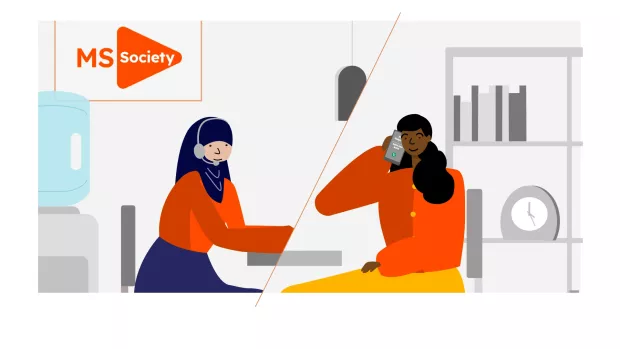
Planning ahead for the care you want
Everyone with MS has the right to make choices about the care they receive now, as well as in the future.
There are ways to record your wishes in case you can’t express them when you really need to. That includes power of attorney, advance decisions and advance statements.
These can be shared with loved ones, carers and health professionals – including on your health record if you choose.
It makes sense to talk about these issues well in advance. If you’ve never talked to your family or healthcare team about what you want to do, or recorded these wishes legally, decisions might be taken by healthcare professionals alone.
Make sure the people who need to know your wishes also know where to find them – otherwise they can’t be used when they’re needed.
Find out more
Power of attorney (POA) lets you appoint a person to take decisions on your behalf if you become unable to do so yourself.
This might include decisions about:
- healthcare and consent to treatment through a ‘lasting power of attorney for health and welfare’
- property and financial affairs through a 'continuing power of attorney’
Anyone can be given POA. They’ll be called the ‘attorney’, but they don’t have to be a lawyer. They could be a family member or someone else you know and trust. And you can have more than one.
If you decide to nominate an attorney, they’ll need to agree to act on your behalf, taking on some legal duties and responsibilities.
Find out more about appointing a power of attorney in your nation:
Everyone has the option to decide in advance to refuse treatment to keep them alive. This is called an advance decision or, in Scotland, an advance directive. It's also known as a ‘living will’.
If you decide to do this, it must be in writing - signed and witnessed.
Advance decisions cover things like:
- cardiopulmonary resuscitation (CPR) for heart failure
- life support machines (ventilatory support) for breathing difficulties
- artificial feeding tubes if you can no longer eat or swallow safely (called 'percutaneous endoscopic gastrostomy' or PEG tubes for short)
An advance decision is legally binding if:
- you are over 18
- it is clear
- you were mentally competent when you made it and you were fully aware of the the consequences of refusing treatment, including the fact that it might hasten death
- you intended the refusal of treatment to apply in the situation that has arisen
- you made the decision on your own and not under the influence of others
An advance decision or advance directive doesn’t allow for euthanasia or assisted dying.
A Do Not Attempt Resuscitation (DNAR) order tells doctors you don’t want to go through procedures that could potentially keep you alive, if you become ill enough to need it. For example, life support machines or cardiopulmonary resuscitation (CPR) for heart failure.
So a DNAR order could be part of an ‘advance decision’ you prepare (an ‘advance directive’ in Scotland). During the early months of the COVID-19 pandemic, DNAR orders were mentioned to some people with long-term conditions including MS.
A doctor should always explain why they have mentioned a DNAR order. Having MS in itself should not be the reason.
The only criteria that should ever be applied to a critical care decision is the chances the person will recover and return to a good quality of life. In the example of COVID-19, many people with MS have a strong likelihood of recovery.
Why would anyone sign a DNAR order?
Some people decide to sign a DNAR order if the life-saving procedure is very high risk for them, or is likely to lead to unwanted complications. Instead of having the procedure, they choose palliative care and spending time with loved ones.
This is obviously a big decision which involves you and your loved ones, and needs clear information from health professionals.
You have the right to sign a DNAR, never an obligation - you should not be pressured to sign a DNAR in any circumstances. You equally have the right to make clear that you definitely want critical care if it is available – although, as with most of emergency medicine, doctors have the right to make the final decision.
Read more about advance decisions to refuse treatment on the NHS website
An 'advance statement' describes your wishes and preferences that might affect the care you want in the future - in case you can’t tell them yourself at the time. These statements are not legally binding but health and social care professionals must consider them.
An advance statement can include things like:
- religious or other beliefs
- food and drink, clothes, or music preferences
- whether you prefer a bath or a shower
- who you’d like to visit you
- who you’d want a care professional to speak to about your care
It's helpful to write this information down, so people can find it and refer to it.


